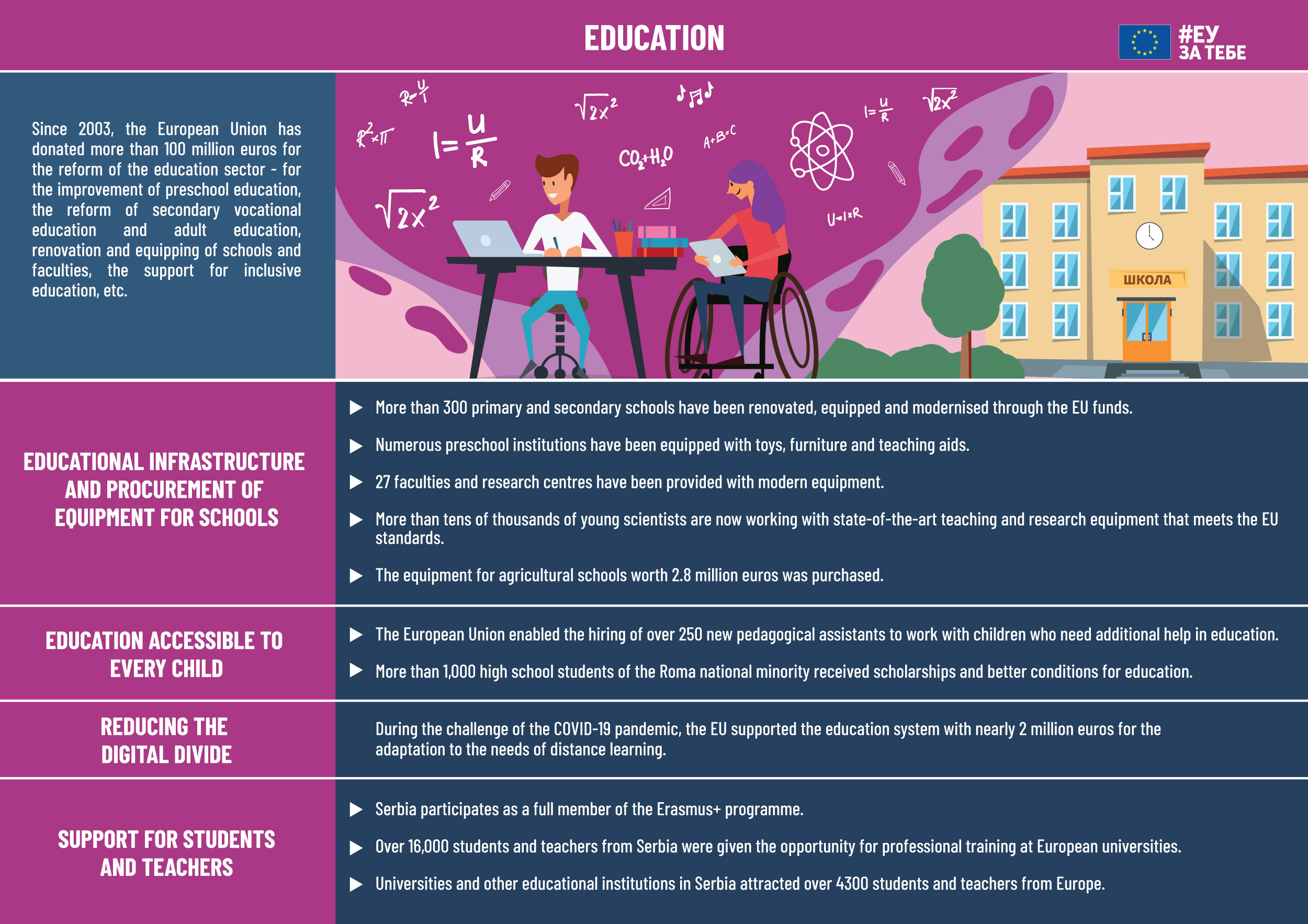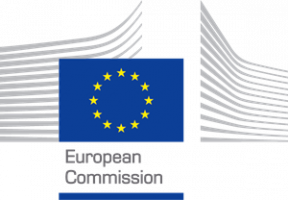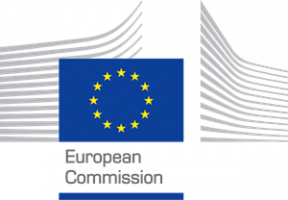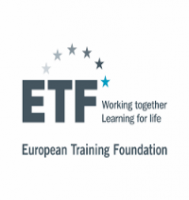About Sector
The European Union is the biggest partner of the Republic of Serbia in the modernisation of the education system. Since 2003, the European Union has donated more than 130 million euros for the reform of the education sector at all levels, with the aim of strengthening its role as the foundation of social and economic development. From pre-school and primary education, through secondary vocational and higher education and adult education - the EU is Serbia's most important partner when it comes to the introduction of new standards, development of teaching and learning programmes, professional training of teachers and financing of new school equipment.
The goal of the EU support to the education sector is to support education reform and help align it with the standards, policies and practices of EU countries, through building the capacity of educational institutions and education employees, aligning education with the needs of the labour market through the development of the qualifications system, the introduction of innovative and inclusive teaching practices and equipping schools with modern teaching aids. Education is considered the basis for creating new jobs, stimulating economic growth, developing individuals and society and strengthening social cohesion, as well as the basis for building a European identity respecting cultural and linguistic diversity.
Serbia is committed to the process of modernising the education sector in accordance with the European and world trends. The modern learning process, based on the needs of the economy and respect for diversity, but also on the needs of students, is one of the priorities of the EU support for Serbia. So far, more than 40,000 educators have acquired new skills and knowledge through professional training. 175 secondary vocational schools were modernised and modern curricula were developed for new educational profiles, in accordance with the needs of the labour market. The work of secondary schools in the fields of agriculture, food production and processing, medicine, mechanical engineering, construction, geodesy and electrical engineering, wood processing and modification, tourism and catering etc. has been improved and modernised. Curricula have been revised in over 40 percent of secondary vocational schools.
The aid of the European Union is aimed at harmonising our educational system with the systems in Europe. With the support of the European Union, the development of the National Qualifications Framework (NQF) in Serbia provided the basis for a modern, relevant and flexible education system that is aligned with the European Qualifications Framework. The orderly evaluation of acquired knowledge and skills of an individual contributes to greater employability on the domestic and international labour market.

The European Union is helping Serbia to introduce a system of final and the state matura exam in secondary education starting in 2024. The introduction of the exam, which is the same for all students at the national level, increases the quality of education, as it provides feedback on the quality of secondary education and directs further investments. It also increases the fairness of the education system, as it creates equal opportunities for objective verification of students' knowledge and competences, as well as more equal access to faculties and the continuation of an academic career.
The European Union invests in educational infrastructure and the procurement of equipment for schools, without which the modernisation of education would not be possible. More than 300 primary and secondary schools were renovated, equipped and modernised with the EU funds. Numerous preschool institutions have been equipped with toys, furniture and teaching equipment. When it comes to higher education, as many as 27 faculties and research centres have been provided with modern equipment, which contributes to higher quality teaching. Numerous laboratories have been equipped, as well. More than tens of thousands of young scientists are now working with state-of-the-art teaching and research equipment that meets EU standards. Equipment for agricultural schools worth 2.8 million euros was purchased, which contributes to students' acquisition of practical knowledge and skills and prepares them for the labour market or continued education.
With the EU's quick and efficient reaction to the catastrophic floods of May 2014, 15 schools were renovated, one elementary school was built, 20 schools received school furniture, and secondary vocational schools received modern equipment for practical classroom teaching. This enabled the regular start of the 2014/2015 school year and helped normalisation of life in 38 municipalities in Serbia.
In order to contribute to quality education being available to every child, the European Union enabled the hiring of over 250 new pedagogical assistants to work with children who need additional help in education. In addition, over 1,000 high school students of the Roma national minority received scholarships and better conditions for education.
As education has a strong influence on personality formation, the EU supports projects aimed at developing analytical and critical thinking among students, strengthening democratic culture, anti-discrimination, etc. The "Quality Education for All" project supported over 60 schools in Serbia to develop and implement action plans and effective strategies for practical work with students, colleagues, parents and members of the local community. By introducing such innovations, teaching is more interesting, and the motivation of students and professors is higher. Schools cooperate more with the local community on various projects, and students have the opportunity to apply new skills in practice, as well as to improve the community in which they live. Teachers' capacities will be enhanced with a wide range of skills related to digital competences, creativity and social skills.
The European Union has been helping the education system during the challenges of the COVID-19 pandemic. Almost two million euros have been donated for the adaption of the education system to the needs of distance learning, thus ensuring access to education for every student. Through the further development of the technical capacity of the distance learning platform and support for the development of its content, the project also supported the establishment of school education libraries in 30 schools that have a significant number of Roma students and poor children, who are most affected by the emergency situation.
Serbia participates as a full member of the largest European programme in the field of education - Erasmus+. With the support of the European Union, students and teaching staff from Serbia participate equally with their colleagues from the EU in exchange and training projects, at all levels of education. Attainments that students achieve during their participation in the programme are recognised as part of their studies. So far, over 17,000 students and teachers from Serbia have had the opportunity for professional development at European universities. At the same time, universities and other educational institutions in Serbia attracted over 5000 students and teachers from Europe. Since the beginning of this programme, Serbia has been the leading country in the region in terms of the number of approved projects, funds and the number of participants in mobility projects.
Serbia has access to various financial mechanisms of the Union. The European Investment Bank (EIB), as a bank of the European Union and a strategic partner of the Government of the Republic of Serbia, has been supporting the reform of the education system in Serbia since 2004. So far, over 275 million euros have been invested in education through long-term loans that support the construction and reconstruction, modernisation and digitisation of 160 primary and secondary schools throughout Serbia. Thanks to the EIB's investment in the education sector in Serbia, more than 100,000 children have gained access to IT equipment that can help them acquire skills that will enable them to find work in the most competitive industries in the future.
EU and education
The European Union supports member states to provide their citizens with the highest quality education. With a common goal - to make Europe a society of knowledge, mobility and exchange, lifelong learning, quality, relevant and efficient education - the European Union enables member countries to exchange ideas and learn from each other. In addition, the European Union ensures that multilingualism, creativity, innovation, entrepreneurship, equity and social cohesion are at the centre of educational policies in Europe.

List of key local partners/organisations
- Ministry of European Integration
- Ministry of finance
- Ministry of Education, Science and Technological Development
- Ministry of Labour, Employment, Veteran and Social Policy
- Ministry of Culture and Information
- Institute for Evaluation and Quality Assurance in Education
- Institute for Improvement of Education
- Qualifications Agency
- National Entity for Accreditation and Quality Assurance in Higher Education (NEAQA)
- Tempus Foundation
- Educational institutions
- Civil society organisations
The European Union, as the largest donor in Serbia, supports the modernisation of the education system and its harmonisation with EU standards and practices. Since 2003, the EU has donated more than 100 million EUR for the improvement of pre-school education, vocational and adult education reform, renovation and refurbishing of schools and faculties, support for inclusive education, etc.


